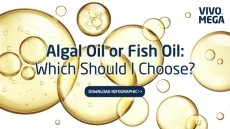Products aimed at kids is a bright spot in murky omega-3s sales picture, emulsion manufacturer says

“Everything that is happening now in the omega-3s space is a little bit muddied by last year’s clinical study results about prostate cancer. My perception in talking about it with industry and retail partners is that is has shaken up the whole category,” Andy Aussie, chief operating officer of Coromega told NutraIngredients-USA.
“Omega-3s used to be one of the areas that was golden, unassailable from an evidence standpoint. So it was quite a surprise among everybody about that result,” he said.
Compliance hurdles
The headwind created by the negative publicity is the main factor afflicting omega-3 sales in North America in the past year. But an additional factor, which was always there, is the complaint consumers have about the palatability of fish oil, all claims of “freshness” notwithstanding.
“The number one complaint about omega-3 fish oil consumption is fish burps,” Aussie said.
This issue with taste and digestibility has served to put a lid on the category and has driven some consumers away, as has been noted by some suppliers of alternative ingredients such as krill oil supplier Aker BioMarine. It also limits how effective the ingredients can be from a health standpoint, Aussie said.
“Fish oil in general is not the easiest to digest. There are a lot of high quality fish oils in softgels out there but if you are not sticking to it you are not getting the benefit. When you take an omega-3 fish oil product consistently over time is when you really start to see increases in blood levels,” he said.
Emulsion advantage
Coromega’s solution, now more than a dozen years old, is a patented emulsion technology that effectively masks the fishy taste while also making the oil easier to digest and so more bioavailable, Aussie said.
“I think emulsions have a fundamental advantage. We did a clinical trial a few years ago that shows that our fish oil in our emulsuion has three times better absorption over regular soft gels,” he said.
“The original idea was to make it more acceptable to kids. If you can get a kid to enjoy fish oil, then I think you’ve got a real victory. If there is growth anywhere in omega-3s, it is in kids and kids consumption,” Aussie said.
Premium product
Coromega uses Peruvian anchovy oil extracted in Norway. The finished oil then comes to the company’s own facility in San Diego to be turned into finished emulsion products. All that attention to the supply chain means the finished product is not cheap, Aussie said. So even with what he calls the technology’s decisive advantages, it can’t compete on price in the mass market.
“We would be considered to be in the premium end of the market. We are in natural food stores and with alternative health practitioners. We are not in grocery and we are really not in drug stores. Our product is not inexpensive so if you are a consumer casually shopping we wouldn’t be a choice. We do better with consumers who know something about omega-3s,” he said.
Autism tie-in
Coromega is a private company so Aussie was circumspect about sales numbers, though he did say the company was “growing nicely.” The company is expanding its technology beyond fish oils to other oils, and now has a 'superfood' product on the maker which is a mixture of oils including chia and hemp. One of the initiatives Aussie highlighted was a tie-in with the support group Generation Rescue, which seeks to provide solutions to families dealing with autistic children. While Aussie was careful to say that the company does not take a stand on the efficacy of omega-3s in helping to ameliorate the symptoms of autism spectrum disorders, he did say the company’s products can help with compliance for those parents who are seeking those benefits. The company has donated products to the group for those families that can't afford them, he said.
“We understand there is a lot of controversy about that so we don’t take a stand on the science. But we think the emulsion technology could have some special benefits for these children. Some of these children on the spectrum have real issues with taste and texture, and our product can help parents who want to give omega-3s to their autistic children,” Ausie said.

















